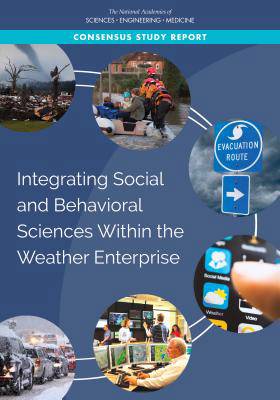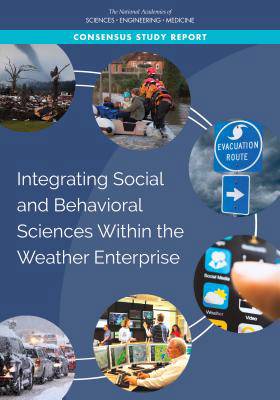
- Retrait gratuit dans votre magasin Club
- 7.000.000 titres dans notre catalogue
- Payer en toute sécurité
- Toujours un magasin près de chez vous
- Retrait gratuit dans votre magasin Club
- 7.000.0000 titres dans notre catalogue
- Payer en toute sécurité
- Toujours un magasin près de chez vous
Integrating Social and Behavioral Sciences Within the Weather Enterprise
National Academies of Sciences Engineering and Medicine, Division of Behavioral and Social Sciences and Education, Division on Earth and Life Studies, Board on Human-Systems Integration, Board on Environmental Change and Society, Board on Atmospheric Sciences and Climate, Committee on Advancing Social and Behavioral Science Research anDescription
Our ability to observe and forecast severe weather events has improved markedly over the past few decades. Forecasts of snow and ice storms, hurricanes and storm surge, extreme heat, and other severe weather events are made with greater accuracy, geographic specificity, and lead time to allow people and communities to take appropriate protective measures. Yet hazardous weather continues to cause loss of life and result in other preventable social costs.
There is growing recognition that a host of social and behavioral factors affect how we prepare for, observe, predict, respond to, and are impacted by weather hazards. For example, an individual's response to a severe weather event may depend on their understanding of the forecast, prior experience with severe weather, concerns about their other family members or property, their capacity to take the recommended protective actions, and numerous other factors. Indeed, it is these factors that can determine whether or not a potential hazard becomes an actual disaster. Thus, it is essential to bring to bear expertise in the social and behavioral sciences (SBS)--including disciplines such as anthropology, communication, demography, economics, geography, political science, psychology, and sociology--to understand how people's knowledge, experiences, perceptions, and attitudes shape their responses to weather risks and to understand how human cognitive and social dynamics affect the forecast process itself.
Integrating Social and Behavioral Sciences Within the Weather Enterprise explores and provides guidance on the challenges of integrating social and behavioral sciences within the weather enterprise. It assesses current SBS activities, describes the potential value of improved integration of SBS and barriers that impede this integration, develops a research agenda, and identifies infrastructural and institutional arrangements for successfully pursuing SBS-weather research and the transfer of relevant findings to operational settings.
Spécifications
Parties prenantes
- Auteur(s) :
- Editeur:
Contenu
- Nombre de pages :
- 198
- Langue:
- Anglais
Caractéristiques
- EAN:
- 9780309464222
- Date de parution :
- 05-02-18
- Format:
- Livre broché
- Format numérique:
- Trade paperback (VS)
- Dimensions :
- 178 mm x 254 mm

Les avis
Nous publions uniquement les avis qui respectent les conditions requises. Consultez nos conditions pour les avis.






